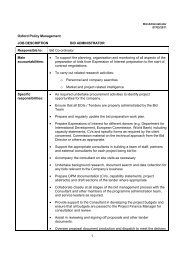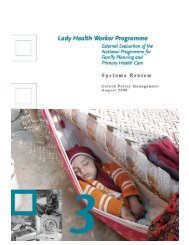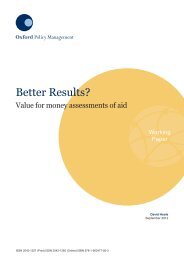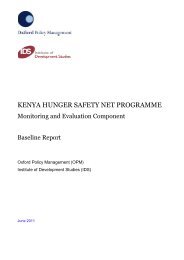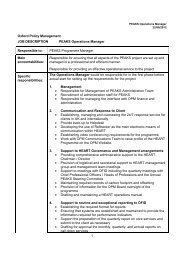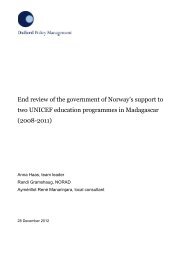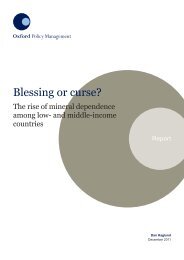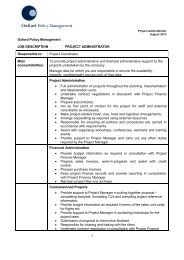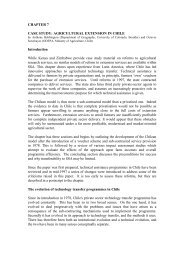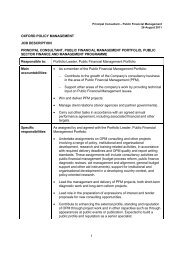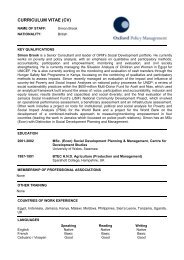LHW Management Review - Oxford Policy Management
LHW Management Review - Oxford Policy Management
LHW Management Review - Oxford Policy Management
Create successful ePaper yourself
Turn your PDF publications into a flip-book with our unique Google optimized e-Paper software.
<strong>LHW</strong>P – <strong>Management</strong> <strong>Review</strong><br />
• The building of partnerships with non-governmental organisations (NGOs) has been<br />
limited. There was limited partnership building with NGOs at the national level.<br />
Individual units of the Programme are not authorised to initiate projects and<br />
partnerships. However, we can use training programmes as an indicator of other<br />
activity. From the results of the survey of <strong>LHW</strong>s it is clear that a reasonable number<br />
of them have attended training courses that have not been authorised by the<br />
Programme. This presents risks, both in a lack of control of the quality of the training<br />
and of the <strong>LHW</strong> becoming confused as to her priorities in service delivery;<br />
• The EPI policy of the national administration of various childhood vaccines by <strong>LHW</strong>s<br />
was not fully implemented 5 ;<br />
• The planned reviews in areas of high expenditure (salary policy; development of a<br />
fleet management system; improvement of the logistics management system.) did<br />
not occur;<br />
• In addition, the Programme failed to address some difficult problems. These include:<br />
the significant number of <strong>LHW</strong>s in Sindh being non-resident in the area served; the<br />
lack of sanction on non-performing <strong>LHW</strong>s; the write-off, disposal and replacement of<br />
outdated vehicles; and on-time procurement of drugs.<br />
Any organisation has limits on the amount of management attention available. In a<br />
bureaucracy working in a challenging environment, such as rural Pakistan, this attention is<br />
quickly absorbed by day-to-day operations. And so it is with the Programme. The<br />
governance arrangements of the Programme are there to allow management (both internal<br />
and within the ministry and departments of health) to provide leadership and to make and<br />
implement the necessary strategic decisions. That they have generally failed to do so<br />
became evident as we addressed the seven questions of the management review. Some of<br />
the issues that were not addressed are as follows: options for decentralisation, noncompliance<br />
with residency criteria in Sindh, issues of integration with Basic Health Units that<br />
have been contracted out to non-governmental organisations and further expansion in urban<br />
areas at the expense of development of the Programme into poorer rural areas. These are<br />
issues that needed to be exposed by the National Coordinator of the Programme, addressed<br />
through the governance committees, and on which decisions needed to be taken to resolve<br />
the issues by the Secretary of Health and the central agencies.<br />
The Programme managers must now plan for the future. There are emerging risks that must<br />
be managed by the Programme. These include:<br />
• Tolerating non-compliance; for example, by the 25 percent of <strong>LHW</strong>s providing a low<br />
level of service, <strong>LHW</strong>s not maintaining the residency criteria in Sindh, <strong>LHW</strong>s working<br />
outside their catchment area and/or for other organisations, and <strong>LHW</strong>s charging for<br />
services. The Programme needs support from government to apply sanctions for<br />
non-compliance.<br />
• The lack of accountability of the Programme to the government for full<br />
implementation of the Strategic Plan and the PC-1 between June 2003 and June<br />
2008. There needs to be a more formal system of reporting against key performance<br />
indicators. The Programme also needs support by government to implement<br />
initiatives that will ensure development and risk management.<br />
• Rapid turnover in management positions at all levels in the Programme presenting a<br />
risk that managers are not in position for sufficiently long periods to provide<br />
leadership. In addition there is a shortage of expertise in the management of the<br />
fleet, procurement, and logistics management at senior levels.<br />
5<br />
This is a separate policy from that of using <strong>LHW</strong>s a mobilisers on National Immunisation Days.<br />
x



